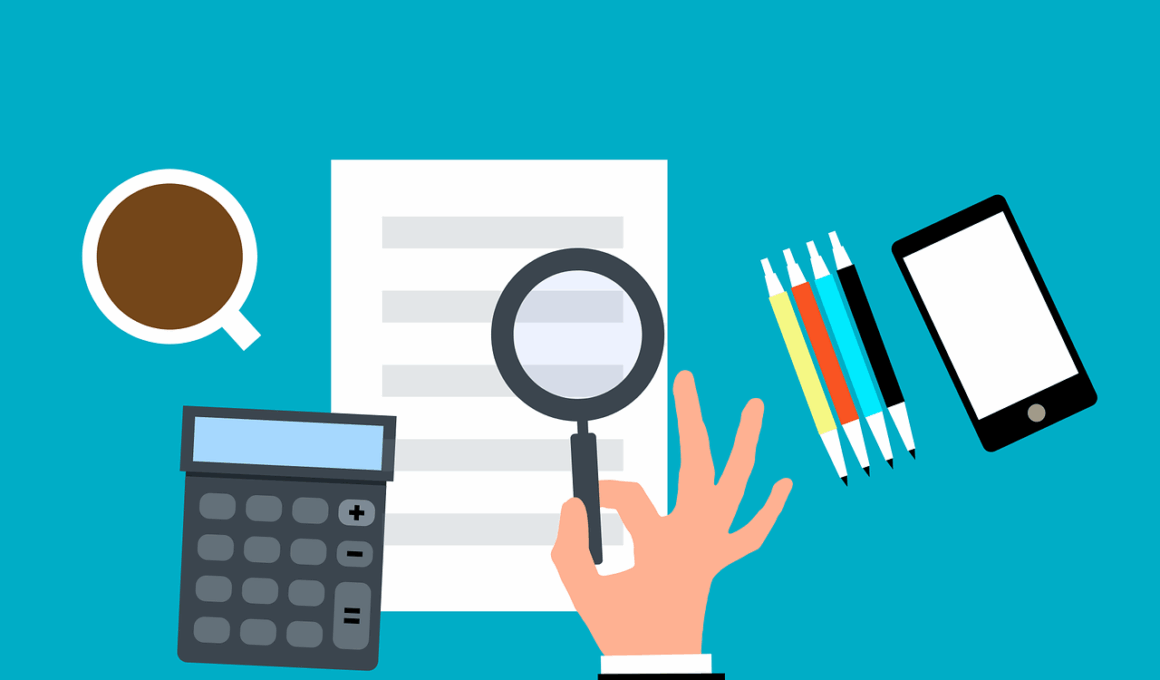How Artificial Intelligence is Enhancing Audit Report Accuracy
Artificial Intelligence (AI) is revolutionizing audit reports by introducing increased efficiency and accuracy through automated processes. AI algorithms, specifically machine learning models, are adept at analyzing vast datasets much faster than human auditors. This capability not only reduces the overall time spent on audits but also minimizes the errors that might occur during manual data entry or analysis. Implementing AI tools allows audit teams to focus on more complex tasks requiring professional judgment, providing more value in their assessments. Furthermore, these technologies continuously learn from new data, improving their forecasting and detection abilities over time. Key AI features being adopted include anomaly detection, predictive analytics, and natural language processing. These features help audit professionals identify discrepancies in financial statements and report findings in a clearer manner. Businesses adopting AI-driven audit solutions can expect to see improved compliance with financial regulations and a greater capacity to identify risk. This shift towards AI not only offers a significant cost reduction but also ensures the provision of more accurate financial insights, which are crucial for strategic decision-making.
The Role of Machine Learning in Auditing
Machine learning plays a vital role in enhancing traditional audit methodologies. By utilizing algorithms that learn from data, auditors can systematically flag unusual transactions and extract valuable insights from patterns within the financial data. This approach minimizes human bias and focuses on objective, data-driven decisions. With machine learning, audits can shift from periodic sampling of transactions to full population analysis, improving accuracy and providing auditors with new perspectives on potential risks. By performing real-time analysis, auditors can react swiftly to emerging irregularities, thereby strengthening risk management protocols. This agility allows organizations to adjust their strategies in anticipation of potential issues, ultimately fostering a proactive rather than reactive auditing culture. Moreover, machine learning can streamline the documentation process of audits by categorizing and labeling findings automatically, enhancing the documentation quality and reducing time spent on report-writing. AI systems can also assist in predicting future trends based on historical data, helping auditors to foresee and address potential areas of concern in advance. Hence, the integration of machine learning into auditing serves as a game-changer, significantly enhancing reliability in auditing outcomes.
As audit reports become increasingly integral in ensuring transparency and compliance, natural language processing (NLP) emerges as another AI innovation enhancing reporting accuracy. NLP technology enables audit systems to comprehend and interpret human language, facilitating improved communication of findings within audit reports. This technology enhances how data and results are presented, transforming raw data into narratives that stakeholders can easily understand. For instance, audit teams can utilize NLP tools to analyze qualitative data such as interview transcripts or open-format survey responses more efficiently, ensuring that significant insights aren’t overlooked. Benefits include a reduction in time spent synthesizing information, allowing auditors to identify key themes and issues more rapidly. Furthermore, NLP-enabled audits can enhance the identification of non-compliance issues and potential risks embedded in narrative explanations. Stakeholders, including management boards and regulators, can appreciate more comprehensive insights from reports, leading to better strategic decisions. Moreover, combing NLP technologies with other AI-driven analytics allows for a multi-faceted approach to interpreting audit data, catering to the evolving needs of financial reporting expectations across industries.
The integration of AI into audit practices also brings a considerable improvement in data integrity and security. AI systems are capable of monitoring transactions and alerting auditors about suspicious activities in real-time, enhancing compliance with various regulations, including those set forth by financial authorities. By leveraging predictive analytics, these technologies can highlight potential areas of non-compliance based on historical trends and behavior, allowing auditors to preemptively address these issues. Furthermore, AI enhances data accuracy by eliminating human errors associated with data entry and computation. However, it’s essential to recognize the risks involved with the implementation of AI. Potential biases in the algorithms can occur if they are trained on biased datasets. This risk underlines the necessity of rigorous oversight while developing and deploying these technologies within auditing functions. Ensuring that AI systems are regularly updated with fresh data helps uphold their effectiveness and accuracy. Moreover, inspiring continuous monitoring procedures can safeguard against evolving risks in financial reporting, demonstrating that blending human expertise with advanced AI capabilities can deliver the most reliable and accurate audit outcomes available.
Benefits of AI in Audit Processes
The benefits of implementing AI within audit processes extend far beyond mere accuracy enhancements. One major advantage is the efficiency gained through automation of repetitive tasks, such as data collection and basic analysis. This efficiency allows auditors to allocate more of their attention toward providing value-added services, such as advising clients on financial strategies, rather than getting bogged down in mundane tasks. As a result, audit firms can serve more clients without sacrificing service quality, significantly boosting operational productivity. Additionally, by embracing AI, audit firms can differentiate themselves from competitors, as they can offer a new level of service that leverages technology to derive insights. The analytics produced from AI systems are often more robust, as they combine both qualitative and quantitative data into comprehensive reports, leading to increased client confidence. Furthermore, clients are becoming more sophisticated and expect services that utilize the latest technologies, making it crucial for audit firms to stay ahead of the curve. Thus, utilizing AI technologies within audit reporting not only improves accuracy but also supports firm growth and client satisfaction, forming a critical element of strategic planning.
Despite the promising advantages, the transition to AI-enhanced audit practices raises questions surrounding job roles and potential skill gaps. As audits move towards more automated processes, there is legitimate concern about the future role of traditional auditors. However, it is essential to recognize that AI does not entirely replace audit professionals; instead, it serves to augment their capabilities. Auditors will still be indispensable for interpreting results, making judgments on financial data, and providing strategic insights based on their expertise. New skill sets focusing on blending technology with traditional auditing principles will become paramount. Training existing staff to effectively utilize AI tools will be crucial in ensuring a seamless transition to this new paradigm. Additionally, audit firms must invest in hiring professionals skilled in data analytics and AI technology to meet the evolving demands of the industry. Continuous learning and adaptation will become critical components of professional development within audit firms. This emphasis on evolving skill sets underscores the reality that AI will redefine roles while simultaneously creating opportunities for professionals willing to learn and grow alongside advancing technology.
In conclusion, the infusion of AI into audit reports signifies a transformative shift towards increased accuracy, efficiency, and reliability in financial reporting. This technological advancement provides auditors with powerful tools that enhance their analytical capabilities and embolden their professional outputs. The integration of machine learning and NLP within audit processes enables auditors to derive better insights from data, thereby producing high-quality findings for stakeholders. Ultimately, AI’s ability to monitor data in real-time fosters an environment conducive to proactive risk management and ensures compliance with financial regulations. By harnessing the strengths of AI, audit firms stand to improve their service offerings, providing more nuanced and strategic insights to their clients. However, as the profession adapts to these changes, a focused effort on professional skill development and ethical considerations surrounding AI usage will be essential. The landscape of financial reporting is evolving, and embracing this evolution will define the audit profession’s future, ensuring not only survival but also remarkable advancements in how audits are conducted. In this new era, AI emerges not merely as a tool but as an essential partner for auditors.








